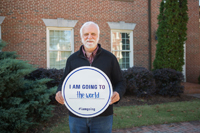Faculty Q & A with David Black
January 19, 2017

 Q: Tell us about yourself.
Q: Tell us about yourself.
A: I’m originally from Hawaii. I attended Biola for undergraduate studies, Talbot for graduate studies and the University of Basel in Switzerland for doctoral studies.
I have three full-time jobs. First, I hold the Dr. M. O. Owens Jr. Chair of New Testament Studies at Southeastern. I also manage a 123-acre farm in Virginia and consider myself a fulltime missionary to Asia, Africa and the Middle East.
My wife Becky and I were married for 37 wonderful years before she passed away last November.
Q: How did you come to SEBTS?
A: I struggled with Greek in college, but once I began to understand it, I really fell in love with the language. After graduating from Biola, I was hired to teach Greek there. In 1998, a couple of seminaries on the East Coast were wondering if I might be interested in moving. I contacted Dr. Patterson, who was president of SEBTS at the time, and he flew Becky and me out for an interview. He opened up a position for me, and we moved and have been here ever since.
Q: When people ask you, “What do you do at Southeastern,” what is your response?
A: I try to model for my students what the downward path of Jesus looks like. Becky and I would often ask ourselves, “How can we best leverage everything we have for the kingdom?” and I try to model that with my students even as I teach Greek.
Q: What are you currently working on?
A: I love to write. In addition to my blog “Dave Black Online,” I’ve got a number of writing projects I’m working on. My beginning Greek grammar is being published in Spanish. I’m also working on a book that describes what it was like to be Becky’s caregiver. Finally, I’m working on a project called “Godworld: Enter at Your Own Risk,” which is about kingdom living.
Q: What have you been reading recently?
A: I enjoy reading books about American history. I also have read everything that Jacque Ellul has ever written.
Q: When you get home from work, what do you look forward to doing?
A: The farm keeps me busy, it’s hard work but good work. I also love to travel and make five to six international trips a year to serve the persecuted church.
Q: Who are your role models?
A: Jim Cook was the pastor at International Baptist Church in Honolulu, Hawaii, and I was one of his “preacher boys” in my teen years. When I got to Biola, my Greek professor, Dr. Sturz, was definitely one of my role models. My Basel professor, Bo Reicke, was my “Doctor Father” and had a huge impact on my life.
Q: What has God been teaching you lately?
A: Ever since losing Becky to cancer, the Lord’s been teaching me to not complain about what I don’t have and to be thankful for what I do have. He’s also been teaching me that grief has a beginning, middle and end.
Q: Where are some of your former students?
A: One of them is currently the dean of a major West Coast seminary. Another is a professor of New Testament at Tyndale Seminary in Holland. One of them just got a job in Minnesota teaching at a Bible school. I’m grateful to God that I have former students in all sorts of roles all around the world.
Q: When a student completes your class, what do you want him or her to walk away with at the end of the semester?
A: I’m mostly asked to teach Greek. I tell my students that the biblical languages are probably the most important subjects they can study because they teach you how to think and not just what to think. I want my students to leave seminary not being just good Christians but obedient followers of the Lord Jesus.
Q: We always say that every classroom at SEBTS is a Great Commission classroom. What does that look like for your class?
A: I’m always hosting missionaries in our classrooms and sharing about my trips with the students. Sometimes when we’re going through the vocabulary we’ll talk about the words and how they affect how we live on mission. We’re always talking about the Great Commission!